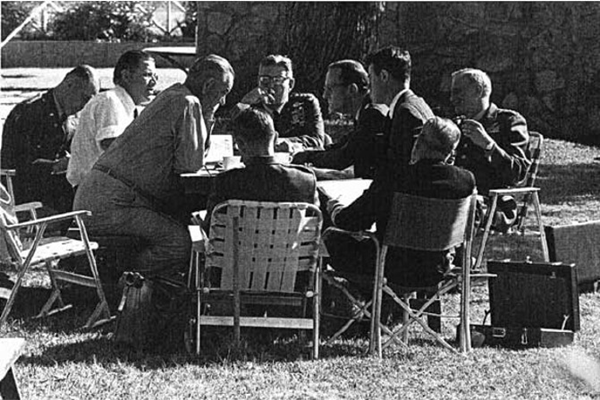President Johnson Agrees to Consider Bombing North Vietnam
December 1, 1964 - December 31, 1964

President Johnson, wrestling with how to stabilize the South Vietnamese government, meets with his top advisers in the White House to discuss South Vietnam’s political and military situation. Those present include Ambassador to South Vietnam Maxwell D. Taylor, Secretary of State Dean Rusk, National Security Advisor McGeorge Bundy, Chairman of the Joint Chiefs of Staff General Earle G. Wheeler, and Secretary of Defense Robert S. McNamara.
Ambassador Taylor tells the president that he believes the current government in Saigon is in danger of collapse. Johnson concurs with Taylor’s assessment and reluctantly agrees—in principle only—with a recommendation to bomb North Vietnam if the South cannot be stabilized soon. The goal of the bombing would be to convince Hanoi’s leaders to cease support for the Viet Cong insurgency in the South. Johnson tells Taylor he has “one last chance” to find a political solution, then he will consider military force. Secretary of Defense McNamara supports Johnson’s decision. The president later instructs his advisers to keep all decisions made at the meeting quiet.1
What Historians Say: This meeting represents a critical turn toward American intervention and escalation of the war in Vietnam. But scholars disagree slightly over its broader significance. Some argue it is significant as the first time President Johnson agrees in principle on the need to attack North Vietnam, and thus is a crucial step along a road to direct American involvement in the ground war. Others agree with that assessment, but note that Johnson does not agree to any actual bombing at this meeting and seems to still hold out hope for a solution that will prevent direct U.S. intervention.
Reading List:
-
Christopher M. Gracek, The Logic of Force: The Dilemma of Limited War in American Foreign Policy (New York: Columbia University Press, 1994)
-
Matthew Moten, Presidents and Their Generals: An American History of Command in War (Cambridge, MA: Harvard University Press, 2014)
-
Brian VanDeMark, Into the Quagmire: Lyndon Johnson and the Escalation of the Vietnam War (New York, Oxford University Press, 1991)